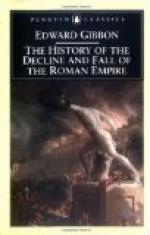|
This section contains 3,021 words (approx. 11 pages at 300 words per page) |

|
SOURCE: Labriola, Albert C. “Enlightenment Historiography and Gibbon's The Decline and Fall of the Roman Empire.” Enlightenment Essays 5, no. 2 (summer 1974): 44-9.
In the following essay, Labriola argues that Gibbon's Decline and Fall is an exemplar of Enlightenment historiography, with its philosophical emphasis on fundamental truths to understand figures, institutions, and events from a period long past.
In The Literary Art of Edward Gibbon (Oxford: Clarendon Press, 1960) Harold L. Bond observes that “the philosophic historian is expected not only to furnish his contemporaries with materials which can be used in forming observations about human action; he should also write history in such a way that the universal principles of human nature are illustrated” (p. 10). As a philosophic historian, Edward Gibbon writes in the tradition of Enlightenment historiography that includes Voltaire, Montesquieu, Robertson, and Hume; and in his Essai sur l'étude de la littérature (1761) he defines the philosophic...
|
This section contains 3,021 words (approx. 11 pages at 300 words per page) |

|


